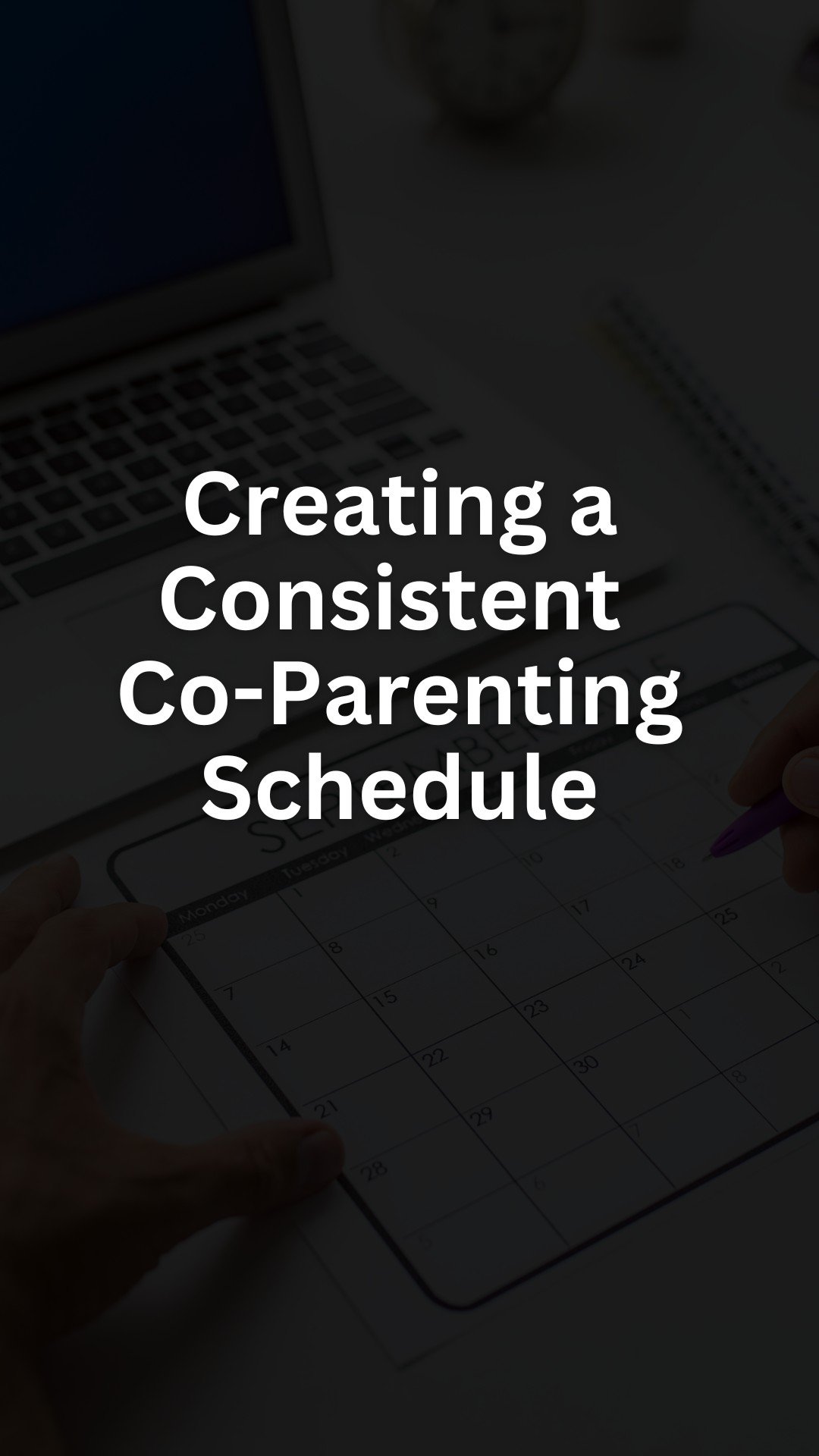Co-parenting after a divorce can be challenging, but it doesn’t have to be a battle. By focusing on the well-being of your children and maintaining open communication with your ex-spouse, you can create a stable and loving environment for your kids.
Effective co-parenting is crucial for the healthy development of your children.
Start by establishing clear boundaries and consistent routines. This helps your children feel secure and understand what to expect, which is essential for their emotional growth.
Maintaining respect and avoiding negative talk about your ex-partner in front of the kids will also foster a loving and balanced environment.
Another important tip is to be flexible and willing to compromise. Children need both parents, and sometimes that means making adjustments to schedules or plans for their sake.
By showing cooperation and understanding, you can make the co-parenting journey smoother and more pleasant for everyone involved.
Establishing Effective Communication

Clear and respectful communication is necessary for successful co-parenting. It helps in making decisions about your child’s well-being and maintaining a peaceful relationship.
Choosing the Right Communication Channels
Select a communication method that works best for both of you. Some parents prefer texting or emails, as it provides a written record. Others may find face-to-face meetings or phone calls more effective.
Use shared calendars and co-parenting apps to keep track of important dates and responsibilities. These tools can reduce misunderstandings.
Make sure the chosen method is comfortable for both parents.
Setting Boundaries and Expectations
Set clear boundaries about what is appropriate to discuss. This can prevent conversations from turning negative.
Agree on a time and place to talk about co-parenting issues. Avoid bringing up disagreements in front of the child.
Then, define and agree on roles and responsibilities. This clarity can minimize conflicts.
Respect each other’s space and time when communicating.
Managing Conflicts Constructively
Handle conflicts calmly and respectfully. If a disagreement arises, take time to cool down before addressing it.
Use “I” statements to express how you feel without blaming the other parent.
Focus on finding solutions rather than assigning blame. Keep the child’s best interests in mind and be willing to compromise when necessary.
If conflicts escalate, consider seeking help from a mediator or counselor.
Creating a Consistent Co-Parenting Schedule

A consistent co-parenting schedule helps your child feel secure. It’s important to balance responsibilities between both parents, be flexible with changes, and establish a steady routine.
Balancing Responsibilities
Balancing responsibilities means sharing duties fairly. Make a list of tasks like school pick-ups, doctor visits, and extracurricular activities.
Then, communicate regularly to ensure both parents know who is responsible for what.
Having a shared calendar can be very useful. Use apps or a physical calendar to mark important dates. You can have weekly check-ins to address any changes or conflicts that need resolving.
Being fair and considering each other’s work schedules and commitments is key. This ensures both parents can participate without feeling overburdened.
Accommodating Changes and Flexibility
Life is unpredictable, and sometimes the co-parenting schedule needs adjustments.
Being flexible and willing to accommodate each other is crucial.
Agree on how to handle sudden changes, such as a parent’s work emergency or a child’s illness.
Then, prepare for any potential changes by discussing backup plans.
If one parent can’t make an event, decide in advance who will step in.
Keep communication open and frequent to address any last-minute changes smoothly.
Make sure that any changes are not disruptive to the child’s routine. Stability is important for their well-being, so aim to make adjustments with minimal impact on their daily life.
Emphasizing Routine for Children
Children thrive on routine. A consistent schedule provides a sense of security and predictability.
Create a daily routine that includes meal times, homework, and bedtime at both homes.
Use a visual schedule that the child can follow. This can be a chart or a calendar that shows where they will be each day.
Make it engaging by allowing them to decorate or mark their days.
Consistency in rules and expectations across both homes is important.
Talk to your co-parent to ensure that bedtime routines, screen time limits, and homework times are similar. This helps children adjust more easily and reduces confusion.
Collaborating on Parenting Decisions

Effective co-parenting requires clear communication and respect for each other’s views on important matters like education, healthcare, and cultural upbringing.
Education and Academic Support
When it comes to your child’s education, both parents should actively participate in school meetings and events.
Agree on a schedule to attend parent-teacher conferences and other important school activities.
Make joint decisions about tutoring and extracurricular activities to ensure your child gets the support they need.
Create a shared calendar to keep track of your child’s academic schedule, exams, and project deadlines.
Use a communication notebook or email updates to exchange information about classroom progress or concerns.
Consistency in rules about homework and study time across both households helps to reinforce good habits.
Healthcare and Medical Choices
Decisions about your child’s healthcare are crucial.
Discuss vaccination schedules, regular check-ups, and any specific medical needs your child might have.
Make an effort to jointly decide on doctors, dentists, and other healthcare providers your child will see.
Keep each other informed of medical appointments and share notes from doctor visits.
Establish an emergency contact plan where both of you are reachable.
Agree beforehand on how to handle urgent medical situations to avoid confusion.
Cultural and Religious Upbringing
If you and your co-parent come from different cultural or religious backgrounds, it’s important to have open conversations about how to integrate both into your child’s life.
Discuss holidays, rituals, and traditions that are important to each of you, and decide on how to celebrate them together or separately.
Ensure that your child is exposed to both cultures or religions in a balanced manner.
Be respectful of each other’s practices and try to attend important cultural or religious events together when possible. This helps to give your child a sense of unity and respect for both heritages.
Fostering Positive Child-Parent Relationships

Maintaining a healthy relationship with your child after divorce is key. This section covers ways to support your child’s bond with both parents, avoid negative talk, and promote open communication.
Supporting the Child’s Relationship with Both Parents
Encourage your child to spend quality time with both parents.
Plan activities that both you and your ex-partner can enjoy with your child.
It’s important to help your child feel comfortable expressing love and affection for the other parent.
Keep a regular schedule for visits and phone calls. Consistency helps your child feel secure.
Share important updates about your child with your ex-partner to ensure everyone is on the same page.
Avoiding Negative Talk about the Other Parent
Never speak poorly about your ex-partner in front of your child. Negative comments can cause stress and confusion for your child.
Instead, focus on positive aspects of the other parent when talking to your child.
If you need to vent, find a friend or therapist. Avoid using your child as a sounding board for your frustrations.
Keeping a respectful tone helps your child maintain a healthy view of both parents.
Encouraging Open and Honest Communication
Create an environment where your child feels safe to share their thoughts and feelings.
Listen actively and without judgment. Validate their emotions and show empathy.
Have regular family meetings to discuss any concerns or issues.
Encourage your child to express their needs and preferences openly.
Always keep the lines of communication open to build trust and understanding.
Managing Financial Responsibilities

Managing finances in co-parenting can be challenging. You need to plan for child-related expenses and handle child support respectfully to ensure the child’s well-being.
Budgeting for Child-Related Expenses
Creating a budget is essential to cover your child’s needs.
Start with a list of recurring expenses, such as groceries, school supplies, and medical costs.
Use a shared spreadsheet, app, or calendar to track these expenses together. Set clear agreements on who will pay for what.
It’s important to review your budget regularly. Add or remove items as needed.
Make sure that both parents are involved in the budgeting process. A transparent and cooperative approach helps avoid conflicts.
Handling Child Support Constructively
Child support is meant to help with your child’s needs.
Communicate clearly about the payments.
Set up automatic transfers to ensure payments are made on time.
If circumstances change, such as job loss or increased expenses, discuss these changes openly.
Respect the child support agreement. Avoid using child support as a weapon in arguments.
Use a respectful tone and remain focused on the child’s needs.
Keep records of all payments and communications to prevent misunderstandings.
Navigating Special Occasions and Holidays

Navigating special occasions and holidays can be challenging for divorced parents. With some planning and a willingness to compromise, you can create new, positive traditions for your children.
Planning and Compromise
Planning ahead is crucial for avoiding last-minute stress.
Start by discussing the holiday schedule with your co-parent well in advance. Consider each parent’s traditions and preferences.
Create a calendar that clearly shows where the children will be during each holiday. This helps avoid confusion and ensures both parents get quality time with the kids.
Open communication and being flexible with your plans will make for smoother celebrations.
When conflicts arise, find middle ground.
If one parent wants Christmas Eve, perhaps the other can have Christmas Day. If travel is involved, discuss the logistics early.
If possible, involve the children in deciding how they want to spend their holidays. This gives them a sense of control and can make the transition easier.
Be sure to uphold any promises made during planning to build trust and reduce anxiety.
Creating New Traditions
Creating new traditions can help your children adjust to the new family dynamic.
Think about activities that everyone enjoys and that are easy to repeat each year.
Consider cooking a special meal together, going on a yearly trip, or having a movie night. These new traditions can make holidays feel special and unique to your family.
Talk to your children about what traditions they would like to start. Their input can make these new traditions more meaningful to them.
If certain old traditions are too painful or complicated now, it’s okay to skip them. Focus on positive experiences that everyone can look forward to.
These new traditions can create lasting memories and provide a sense of continuity and joy despite the changes in family structure.
Co-Parenting with New Partners

Introducing a new partner to your children and setting boundaries can help maintain a healthy co-parenting environment. These steps can reduce tension and create a stable atmosphere.
Introducing New Partners to Children
When you have a new partner, it’s important to think about how and when to introduce them to your children.
Timing is key. Don’t rush; give your children time to adapt to the changes.
Talk to your ex-partner about your plans to ensure everyone is on the same page.
Before the introduction, talk with your children about your new partner. Answer their questions honestly, but keep it simple.
A casual outing, like a trip to the park, can be a good first meeting. Keep it light and brief to avoid overwhelming your children.
If your children feel unsure or uneasy, respect their feelings. Arrange more short and enjoyable meetings to help them get comfortable.
Stay patient and reassure them that they are a priority in your life.
Setting Boundaries with New Partners
Setting clear boundaries with your new partner regarding co-parenting can prevent misunderstandings.
Discuss the roles your new partner will have around your children.
Make sure they know they are not a replacement parent, but a supportive adult.
Communication with your ex-partner is crucial to defining these boundaries. You need to agree on how much involvement your new partner will have, such as attending school events or other activities.
Respect existing rules and routines that are already in place. This consistency helps your children feel secure.
Always place the best interests of your children first, and keep the lines of communication open for adjustments as needed.
Taking Care of Your Own Well-Being

Taking care of yourself is vital when co-parenting. It helps you remain strong, balanced, and ready to support your children.
Seeking Support When Needed
It’s important to recognize when you need help. Having a strong support system can make a big difference.
Talk to friends or family members you trust. They can give you advice or just listen when you need to vent.
There are also professional resources available. Therapists and counselors are trained to help you manage stress and emotions. Support groups offer a chance to connect with others who understand what you’re going through. Online forums can also be helpful for finding support and sharing experiences.
Sometimes, a simple break or a change of scenery can help. Take a short walk or do something you enjoy to clear your mind.
Establishing Personal Time
Balancing personal time is crucial. Schedule regular “me time” to recharge.
It can be as simple as reading a book, taking a bath, or enjoying a hobby. Remember, it’s okay to take time for yourself without feeling guilty.
Communicate your need for personal time to your co-parent. Work together to create a schedule that allows each of you to have time off from parenting duties. This helps prevent burnout and keeps both parents healthy and happy.
Exercise is another effective way to take care of yourself. Physical activity reduces stress and boosts your mood. Even short workouts or a brisk walk can make a big difference.
Utilizing Professional Resources

Seeking outside help can be very important for co-parenting. Family therapy and legal services can offer guidance and support during both peaceful and challenging times.
Family Therapy Options
Family therapy can help you and your co-parent communicate better. Therapists specialize in resolving conflicts and teaching effective communication skills. They provide a safe space to express feelings and discuss parenting strategies.
Some types of family therapy include cognitive-behavioral therapy, which helps change negative thought patterns, and systems therapy, focusing on family dynamics. Group therapy can connect you with other families facing similar challenges.
Consider online therapy if in-person sessions are difficult to schedule. Many therapists offer virtual appointments, providing flexibility and convenience. Regular sessions with a skilled therapist can make co-parenting smoother and improve relationships within the family.
Legal and Mediation Services
Legal services are crucial for navigating custody agreements and resolving disputes. A family lawyer can help draft fair custody arrangements and ensure they are legally binding. They can also guide you through any modifications needed as your children grow older or circumstances change.
Mediation services offer a less adversarial approach. A trained mediator helps both parents reach agreements on custody and other issues without going to court. Mediation is often faster and less expensive than litigation.
Benefits of Mediation:
- Cost-effective: Usually cheaper than hiring lawyers and going to court.
- Time-saving: Quicker resolution compared to lengthy legal battles.
- Less Stressful: Encourages cooperation rather than conflict.
Using these professional resources can help create a supportive environment for raising your children together.
Engaging in Continuous Learning and Adaptation

To co-parent well, always be open to learning. Your child’s needs change as they grow, and it’s important to stay informed.
Read books and articles about child development. Attend workshops and webinars that focus on parenting and co-parenting skills.
Join support groups or online forums for divorced parents. Sharing experiences with others can provide new insights and ideas.
Reflect on your own behavior. Ask yourself what is working and what isn’t. Being honest about your strengths and weaknesses helps you improve.
Communication is key. Regularly talk with your co-parent about what is working for your child and what needs to change.
Be flexible. What works today might not work tomorrow. Adapt your approach as needed. Listen to your child and be willing to make adjustments.
Set goals together. Agree on what is most important for your child’s well-being. Work towards these goals as a team.
Celebrate progress. When things improve, even in small ways, acknowledge it. Positive reinforcement helps both you and your co-parent stay motivated.
Always keep learning. Seek advice from professionals like counselors or therapists. They can offer new strategies and support.
Frequently Asked Questions

Co-parenting can be challenging, yet with clear boundaries and effective communication, it is manageable. The following questions provide vital advice for successful co-parenting after divorce.
How can divorced parents establish effective co-parenting boundaries?
Establish clear rules about communication, schedules, and decision-making. Respect each other’s time and parenting style. Consistently follow the agreed-upon plan. Maintain politeness and avoid personal conflicts during interactions.
What are the advantages and disadvantages of co-parents spending time together?
Spending time together can create stability for children and reinforce cooperation. However, it may also stir up past emotions and conflicts. Finding a balance is key. Opt for neutral settings and focus on the children.
Can you provide examples of successful co-parenting strategies?
Create a shared calendar for important dates and activities. Hold regular meetings to discuss the children’s progress and needs. Use a consistent routine across both households. Always present a united front to the children.
What are the best practices for co-parenting with an ex-partner you still have feelings for?
Keep emotions in check and focus on the children’s well-being. Seek external support, like friends or a therapist, to manage your feelings. Have structured communication and avoid personal topics. Keeping interactions brief and child-focused can help.
What are common challenges faced by co-parents after divorce, and how can they be overcome?
Challenges include communication issues, scheduling conflicts, and differing parenting styles. Overcome these by staying flexible, prioritizing the children’s needs, and using mediation services if necessary. Always be willing to compromise and cooperate.
How should parents handle co-parenting disagreements without negatively impacting their children?
Keep disagreements private and away from the children.
Communicate calmly and listen to each other’s perspectives.
Use problem-solving techniques and, if needed, involve a neutral mediator.
Focus on finding solutions that benefit the children.